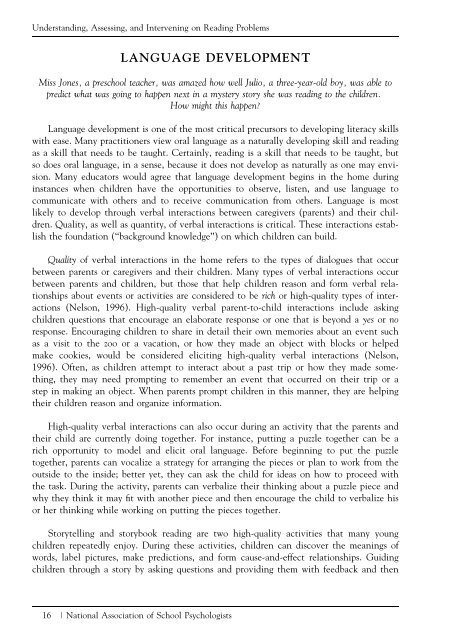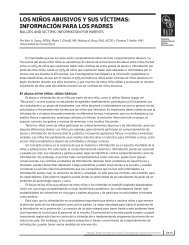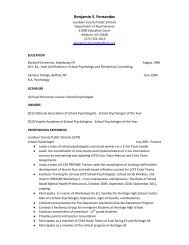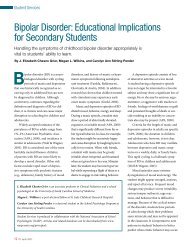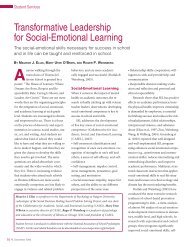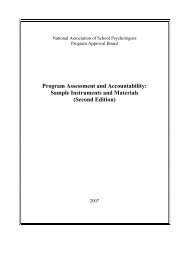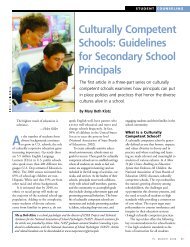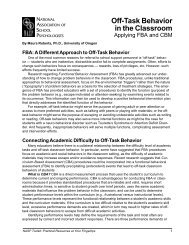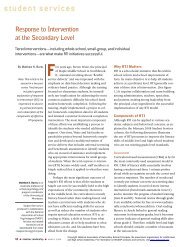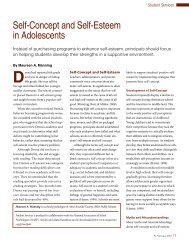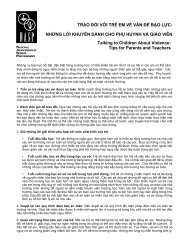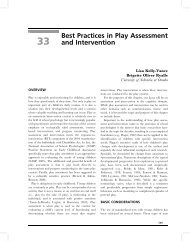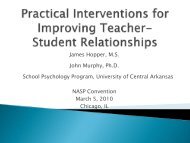Chapter 1 - National Association of School Psychologists
Chapter 1 - National Association of School Psychologists
Chapter 1 - National Association of School Psychologists
You also want an ePaper? Increase the reach of your titles
YUMPU automatically turns print PDFs into web optimized ePapers that Google loves.
Understanding, Assessing, and Intervening on Reading Problems<br />
LANGUAGE DEVELOPMENT<br />
Miss Jones, a preschool teacher, was amazed how well Julio, a three-year-old boy, was able to<br />
predict what was going to happen next in a mystery story she was reading to the children.<br />
How might this happen?<br />
Language development is one <strong>of</strong> the most critical precursors to developing literacy skills<br />
with ease. Many practitioners view oral language as a naturally developing skill and reading<br />
as a skill that needs to be taught. Certainly, reading is a skill that needs to be taught, but<br />
so does oral language, in a sense, because it does not develop as naturally as one may envision.<br />
Many educators would agree that language development begins in the home during<br />
instances when children have the opportunities to observe, listen, and use language to<br />
communicate with others and to receive communication from others. Language is most<br />
likely to develop through verbal interactions between caregivers (parents) and their children.<br />
Quality, as well as quantity, <strong>of</strong> verbal interactions is critical. These interactions establish<br />
the foundation (‘‘background knowledge’’) on which children can build.<br />
Quality <strong>of</strong> verbal interactions in the home refers to the types <strong>of</strong> dialogues that occur<br />
between parents or caregivers and their children. Many types <strong>of</strong> verbal interactions occur<br />
between parents and children, but those that help children reason and form verbal relationships<br />
about events or activities are considered to be rich or high-quality types <strong>of</strong> interactions<br />
(Nelson, 1996). High-quality verbal parent-to-child interactions include asking<br />
children questions that encourage an elaborate response or one that is beyond a yes or no<br />
response. Encouraging children to share in detail their own memories about an event such<br />
as a visit to the zoo or a vacation, or how they made an object with blocks or helped<br />
make cookies, would be considered eliciting high-quality verbal interactions (Nelson,<br />
1996). Often, as children attempt to interact about a past trip or how they made something,<br />
they may need prompting to remember an event that occurred on their trip or a<br />
step in making an object. When parents prompt children in this manner, they are helping<br />
their children reason and organize information.<br />
High-quality verbal interactions can also occur during an activity that the parents and<br />
their child are currently doing together. For instance, putting a puzzle together can be a<br />
rich opportunity to model and elicit oral language. Before beginning to put the puzzle<br />
together, parents can vocalize a strategy for arranging the pieces or plan to work from the<br />
outside to the inside; better yet, they can ask the child for ideas on how to proceed with<br />
the task. During the activity, parents can verbalize their thinking about a puzzle piece and<br />
why they think it may fit with another piece and then encourage the child to verbalize his<br />
or her thinking while working on putting the pieces together.<br />
Storytelling and storybook reading are two high-quality activities that many young<br />
children repeatedly enjoy. During these activities, children can discover the meanings <strong>of</strong><br />
words, label pictures, make predictions, and form cause-and-effect relationships. Guiding<br />
children through a story by asking questions and providing them with feedback and then<br />
16 <strong>National</strong> <strong>Association</strong> <strong>of</strong> <strong>School</strong> <strong>Psychologists</strong>


